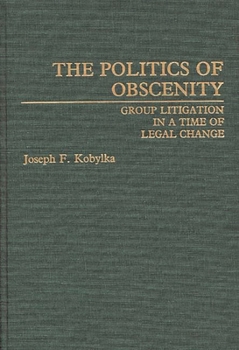The Politics of Obscenity: Group Litigation in a Time of Legal Change
This study is an empirical analysis of how the fluctuating legal environment in the courts surrounding obscenity litigation over a thirty year period is an appropriate vehicle with which to demonstrate the dynamics of widespread group involvement in the judicial process. Joseph F. Kobylka traces how the development of the obscenity law from the 1957 Roth v. United States decision, which established the proscription of obscenity through its libertarian interpretation by the Warren court and its reaffirmation by the 1973 Miller v. California decision, necessitated changes in both the behaviors and strategies of libertarian and conservative groups in the active pursuit of their particular goals.
After a review of the shifts in the Supreme Court's doctrines concerning obscenity, Kobylka identifies the various political interest groups, and examines their motives, goals, and the factors, both internal and external, that determined their responses to Miller. He concludes with a summary of findings confirming that the study's empirical approach yields a comprehensive understanding of the fluidity of group politics. Specific group involvement is documented in the appendices, and bibliographies furnish lists of books, articles, and a table of cases. The Politics of Obscenity will be a useful, authoritative volume for advanced courses in the judicial process and group politics, and will also be invaluable to academic libraries, political scientists, and other scholars.Format:Hardcover
Language:English
ISBN:0313268827
ISBN13:9780313268823
Release Date:March 1991
Publisher:Praeger
Length:224 Pages
Weight:1.19 lbs.
Dimensions:0.9" x 6.3" x 9.5"
Customer Reviews
0 rating





